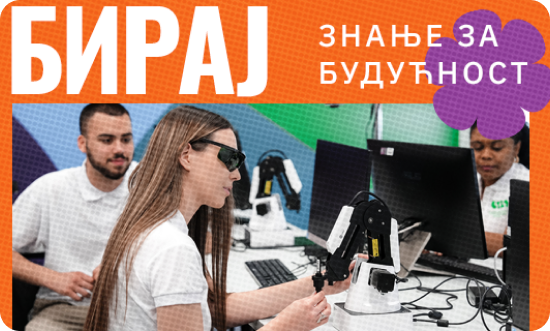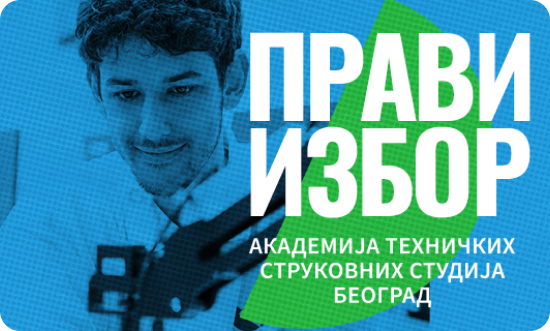

General information
English name: The Academy of Applied Technical Studies Belgrade
Full legal name: Akademija tehničkih strukovnih studija Beograd
Address: Katarine Ambrozić 3, Belgrade, Serbia
Description of the institution (including type and status)
The Academy of Applied Technical Studies is the institution of tertiary education, founded in September 2019 by the Government of Republic of Serbia. It was formed by integration of four Higher Education Institutions – College of Professional Studies – Belgrade Polytechnic, College of Professional Engineering Studies ‘’Tehnikum Taurunum’’, College of Professional Technical Studies ‘’Novi Beograd’’ and College of Professional Technical Studies ‘’Požarevac’’. All these HEIs had a long tradition in Higher Education and they successfully passed three cycles of accreditation (in 2007, 2012 and 2017), in accordance with the Law on Higher Education in Serbia.
The Academy is organised in four Units – Section of Belgrade Polytechnic, Section of Computer and Mechanical Engineering, Section of Traffic, Mechanical Engineering and Safety Engineering, and Section of Applied Engineering Sciences. The three Sections of the Academy are located in Belgrade and the Section of Applied Engineering Sciences is located in Požarevac.
The Academy offers professional education in 13 specific areas through 21 undergraduate study programmes, two specialist programmes and 11 programmes at master applied level. Variety of study programmes enables the Academy to respond growing needs of industry and society at all levels.
In addition to good theoretical background that all Sections of the Academy offer to their students, they have built strong cooperation with the industry in terms of student practical placement, internship, training courses, as well as collaboration in many professional activities.
In this moment, the Academy is preparing to establish Quality Management System (QMS) based on the experience that the Belgrade Polytechnic College has had since 2009. The Belgrade Polytechnic College established QMS according to ISO 9001:2008 and certified by YUQS and IQNet in the field of Higher Education (re-certified in 2018 according to ISO 9001:2015). Additionally, the Academy strives to hold the good practice of the Belgrade Polytechnic College in the sense of international cooperation. The Belgrade Polytechnic College obtained the Erasmus Charter for Higher Education (ECHE) in 2018.
Academic authorities
President: Ph.D. Marina Stamenović, Professor of professional studies
Academic calendar
The classes are organized in two semesters – fall and spring, six days per week. The academic year commences on 1 October and ends on 30 September.
Calendar for academic year 2023/2024
| DURATION OF SEMESTERS AND HOLIDAYS | ||||||
| Date | Event | |||||
| Sunday, 1 October 2023 | Fall semester classes commence (for the students of the first year of study) | |||||
| Monday, 16 October 2023 | Fall semester classes commence (for the students of the second and third year of study, and master students) | |||||
| Saturday, 11 November 2023 | The national holiday – day off | |||||
| Wednesday, 29 November 2023 | Day of the Academy – day off | |||||
| Sunday, 31 December 2023 – Saturday, 6 January 2024 Friday, 16 February 2024 Saturday, 27 January 2024 Thursday, Friday, 15 – 16 February 2024 Saturday, 17 February 2024 Wednesday, Thursday, 1 – 2 May 2024 Friday, 3 May – Monday, 6 May 2024 | New Year and Christmas (Orthodox) break – days off Fall semester ends Saint Sava Day – academic holiday National holiday – days off Spring semester commence Labor Day – days off Easter (Orthodox) break – days off | |||||
| Friday, 31 May 2024 | Spring semester ends | |||||
| Monday, 8 July – Sunday, 18 August, 2024 | Summer break | |||||
| EXAMINATION TERMS | ||||||
| 19 January – 31 January 2024 3 February – 14 February 2024 | January examination term February examination term | |||||
| 6 June – 16 June 2024 21 June – 1 July 2024 | June examination term July examination term | |||||
| 21 August – 31 August 2024 7 September – 19 September 2024 | September examination term October examination term | |||||
ECTS credit allocation policy and grading system
Information about ECTS credit allocation policy and grading system can be seen and downloaded here.
Arrangements for academic guidance
Students have necessary academic and non-teaching support during the whole study period. The staff of the International Office provides information and assistance in solving academic problems, taking care about the implementation of ethical norms among students, etc.
List of tutors:
SECTION OF BELGRADE POLYTECHNIC:
- Ivana Matić Bujagić (imatic@atssb.edu.rs)
- Koviljka Banjević (kbanjevic@atssb.edu.rs)
- Dragana Gardašević (dgardasevic@atssb.edu.rs)
SECTION OF COMPUTER AND MECHANICAL ENGINEERING:
- Aleksandra Mitrović (amitrovic@atssb.edu.rs)
COLLEGE OF TRAFFIC, MECHANICAL ENGINEERING AND SAFETY ENGINEERING:
- Milan Marković (mmarkovic@atssb.edu.rs)
SECTION OF APPLIED ENGINEERING SCIENCES:
- Darko Stojićević (dstojicevic@atssb.edu.rs)
Language policy for outgoing mobile participants
In order to provide high quality of mobility of students and staff, the Academy ensures that all mobility participants have required level of language of instruction. The applicants not having the required level of foreign language proficiency are referred to attend foreign language courses. The Academy provides the English language courses by the undergraduate programme, during two semesters, and they are offered to all students. The Online Linguistic Support (OLS) platform includes online language courses that are accessible for students chosen for the mobility programme. In addition to OLS, the Academy organizes other languages courses from the external funds to help outgoing students to improve their language of mobility or take a course in the local language of their destination country.
The outgoing students are also well informed about the Erasmus Intensive Language Courses which they are able to attend in the foreign country in order to improve their language skills.
Language support for incoming mobile participants
The incoming participants are referred to individual courses of Serbian language which are designed to cover both communication skills and specialized vocabulary in accordance to the profile of our institution. After the successful completion of the course a certificate of attendance is issued. The International Office at the Academy is ready to help the incoming students and staff to understand and use common everyday expressions and very basic phrases aimed at the satisfaction of needs of a concrete type. Since consultative classes and communication with lecturers for foreign students are in English, it is advised that they have necessary level of linguistic proficiency.
Resources and services
All relevant information regarding support for incoming students/staff can be seen in our Student/Staff Guide. Please feel free to contact International Office of the Academy for any further information.









